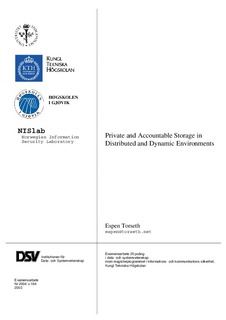| dc.contributor.author | Torseth, Espen | |
| dc.date.accessioned | 2008-04-02T10:32:20Z | |
| dc.date.issued | 2004 | |
| dc.identifier.uri | http://hdl.handle.net/11250/143912 | |
| dc.description.abstract | NORSK:
En av de store utfordringene i dagens teknologier for dstribuert prosessering
er hvordan skal policy knyttet til data bevares når data flyttes omkring
i distribuerte miljø. De fleste nåværende teknologier ser ut til å anta at enten
så eksisterer det en global lagringsinfrastruktur som passer alle brukere,
eller at policy er enkelt å flytte og utrykke likeverdig godt på hvilket som
helst lagringssystem. Når du legger til den dynamiske naturen til slike distribuerte
systemer og behovet for både personvern og etterrettlighet, så er
det åpenbart at begge disse antagelsene er feilaktige.
Her blir en alternativ, og noe ny, tilnærimngsmåte presentert. Denne
nye tilnærimngsmåten blir basert på observasjon av likheter mellom ulike
miljø for distribuert prossessering, f.eks. Grid, mobile agenter og peer-to-peer
nettverk, og ved å skille ut håndheving av policy fra selve lagringen av data.
Personvern og etterrettlighet vil bli vist at er mulig i denne nye tilnærimngen
ved å kombinere teknikker fra anonymiserende epost-systemer og peer-topeer
nettverk med tiltrodde tredjeparter og delvis tiltrodde observatører.
En abstrakt model for en generalisert distribuert prossesseringsnode ble
laget for å løsrive tilnærimngsmåten fra et spesifikt system for distribuert
prossessering. Oppgaven spesifiserer en protokoll for å utstede pseudonymer
til brukere, som blir spesifisert og formelt analysert ved hjelp av Casper
og FDR2. Et system for anonymiserte meldinger blir beskrevet, men ikke
formelt analysert. Til slutt blir tilnærimngsmåten for lagring beskrevet i
nødvendig detaljeringsnivå for mulig analyse og implementering. | no |
| dc.description.abstract | ENGELSK:
One of the major challenges in current technologies for distributed computing
is how to preserve the policy applied to data when the data moves
around in the distributed environment. Most technologies today seem to
assume that either there is a global storage infrastructure suitable for all
users, or that the policy is trivial to transfer and express equally well on
any storage system. When you add the dynamic nature of these distributed
environments and the need for both privacy and accountability, it is obvious
that both these assumptions are flawed.
Here an alternative, and somewhat novel, approach to distributed storage
is presented. This new approach is based on observing the commonalities
between different distributed computing environments, e.g. Grids, mobile
agents and peer-to-peer networks, and by separating the policy enforcement
from the data storage. Privacy and accountability will be shown to be achievable
in this new approach by combining techniques from anonymous remailers
and peer-to-peer networks with a trusted third party and partially trusted
observers.
An abstract model for a generalized distributed computing node was
made to disentangle the approach for storage from any specific distributed
computing system. The thesis specifies a protocol for providing pseudonyms
for users, which is specified and analyzed formally with Casper and FDR2.
A system for anonymous messaging is given, but is not formally analyzed.
Finally the storage system is described in sufficient detail for possible analysis
or implementation. | en |
| dc.format.extent | 456570 bytes | |
| dc.format.mimetype | application/pdf | |
| dc.language.iso | eng | en |
| dc.subject | datasikkerhet | en |
| dc.subject | informasjonssikkerhet | en |
| dc.title | Private and Accountable Storage in Distributed and Dynamic Environments | en |
| dc.type | Master thesis | en |
| dc.subject.nsi | VDP::Mathematics and natural science: 400::Information and communication science: 420::Security and vulnerability: 424 | en |
